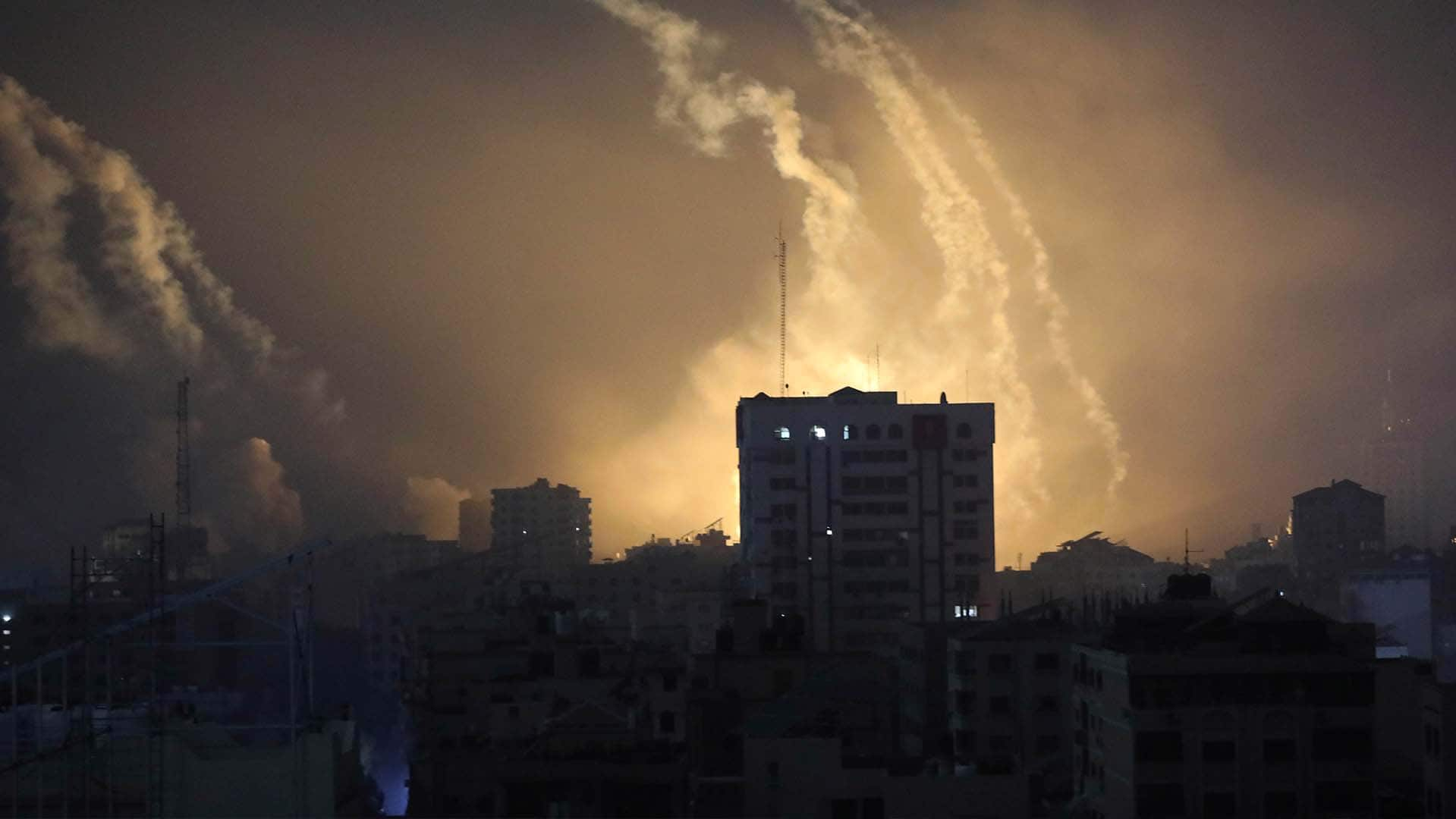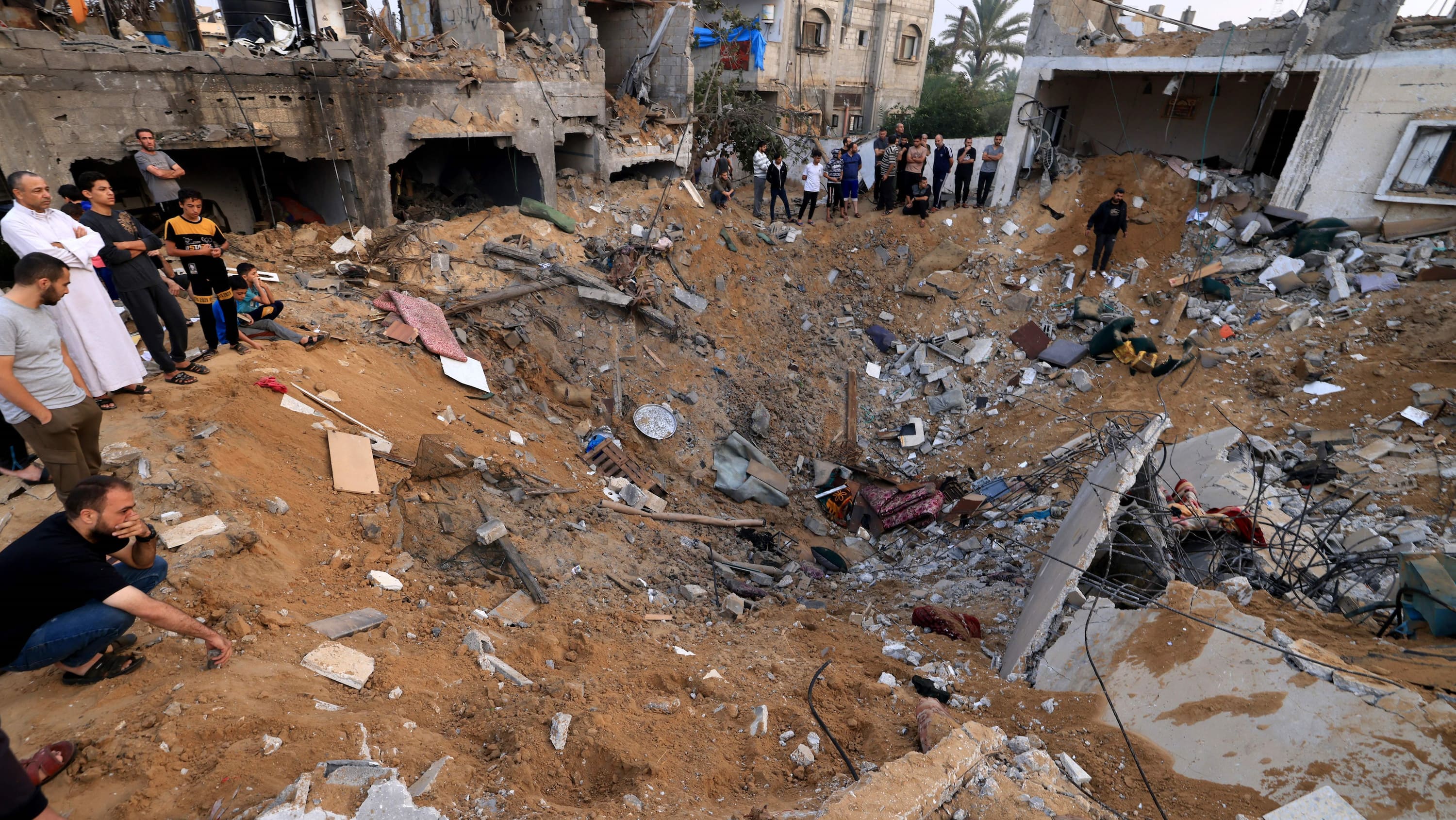[ad_1]
Israel is now in the second phase of its war against the Palestinian militant group Hamas, ramping up a ground offensive in the Gaza Strip, Prime Minister Benjamin Netanyahu said in an address to the nation Saturday night.
Netanyahu said the Israeli Defence Forces have deployed throughout Gaza.
“We want to dismantle Hamas and bring hostages home,” Netanyahu said, shortly after meeting with families of some of the more than 200 people militants have held hostage in Gaza since the Hamas-led attack on Israel three weeks ago.
Netanyahu referred to the conflict as Israel’s “second war for independence” and vowed Israel will not surrender nor withdraw from Gaza until its goal of eliminating Hamas is complete.
But he lashed out at criticism of the Israeli offensive, and relentless bombardments of the Gaza Strip, saying any accusation that Israel forces are committing war crimes is hypocrisy.
More to come. Previous story continues below.
The latest:
- Israel carries out most intensive attacks yet against Hamas targets, expanding ground operations.
- Israeli military spokesperson urges residents of Gaza to immediately relocate south.
- Palestinian telecom provider reports “complete disruption” of internet in Gaza.
- Israeli military says it’s planning on allowing trucks carrying food, water and medicine to enter Gaza today.
- U.S. and Canada warns citizens to leave Lebanon, as Israel strikes at Hezbollah military infrastructure.
Israel is expanding its ground operation against Hamas militants in Gaza with infantry and armoured vehicles backed by “massive” strikes from the air and sea, a military spokesperson said Saturday.
Rear Adm. Daniel Hagari said “forces are still on the ground and are continuing the war.”
Previously, troops had conducted brief nightly ground incursions before returning to Israel.

Earlier Saturday, the military had released videos showing columns of armoured vehicles moving slowly in open sandy areas of Gaza, the first visual confirmation of ground troops, and said warplanes bombed dozens of Hamas tunnels and underground bunkers.
The move is a further escalation in Israel’s campaign to crush the territory’s ruling militant group Hamas after its bloody incursion in southern Israel three weeks ago — a new sign that Israel is moving closer to an all-out invasion of Gaza.
Late Friday, Hagari said ground forces were “expanding their activity” in Gaza and “acting with great force … to achieve the objectives of the war” as Israel amassed hundreds of thousands of troops along the border.
- Are you in the Middle East and affected by the war between Israel and Hamas? We want to hear about your experience. Send an email to ask@cbc.ca.
Hagari appeared Saturday in a video message on X, formerly known as Twitter, to urge Palestinians in northern Gaza and Gaza City to immediately relocate south.
“This is a temporary measure. Moving back to northern Gaza will be possible once the intense hostilities end,” he said.
Overnight into Saturday, warplanes struck 150 tunnels and underground bunkers in northern Gaza, the military said. Hamas’s extensive underground installations, many of them located under Gaza City in the north of the territory, are seen as key targets of the offensive.

UN Secretary-General Antonio Guterres said on Saturday he was surprised by Israel’s escalation of the bombardments in Gaza, and repeated a call for an immediate humanitarian ceasefire for the delivery of aid.
“I was encouraged in the last days by what seemed to be a growing consensus in the international community … for the need of at least a humanitarian pause in the fighting,” Guterres said in a statement.
“Regrettably, instead of the pause, I was surprised by an unprecedented escalation of the bombardments and their devastating impacts, undermining the referred humanitarian objectives.”
The Palestinian death toll in Gaza on Saturday rose to just over 7,700 people since Oct. 7, with 377 deaths reported since late Friday, according to the territory’s Hamas-run Health Ministry.
A majority of those killed have been women and minors, the ministry said. Ministry spokesperson Ashraf al-Qidra told reporters that the disruption of communications has “totally paralyzed” the health network.
An estimated 1,700 people remain trapped beneath the rubble, according to the Gaza Health Ministry, which has said it bases its estimates on distress calls it received.
More than 1,400 people were slain in Israel during Hamas’s Oct. 7 attack, according to the Israeli government, and at least 229 hostages were taken into Gaza. Among those killed were at least 310 soldiers, according to the Israeli government.
Featured VideoIsrael says it is ‘expanding’ ground operations in Gaza, but with communications cut off and much of the territory plunged into darkness, the full extent of its attack is unclear and the humanitarian situation is as desperate as ever.
Rescuers forced to chase sound of explosions
As part of the stepped-up bombardment, Israel also knocked out communications and created a near-blackout of information, largely cutting off the 2.3 million people in besieged Gaza from contact with the outside world.
Residents had no way of calling ambulances, and emergency teams were chasing the sounds of artillery barrages and airstrikes to search for people in need.
Already plunged into darkness after most electricity was cut off weeks ago, Palestinians were thrown into isolation, huddling in homes and shelters with food and water supplies running out. Attempts to reach Gaza residents by phone were largely unsuccessful early Saturday.
With no electricity, no communications and no water, many of those trapped in Gaza had little choice but to wait in their homes or seek the relative safety of schools and hospitals even as Israel expanded its bombing early Saturday.
The Palestinian telecom provider, Paltel, said the bombardment caused “complete disruption” of internet, cellular and landline services. Relatives outside Gaza panicked after their messaging chats with families inside suddenly went dead and calls stopped going through.
Featured VideoCanadian physician Dr. Tanya Haj-Hassan says she heard from doctors in Gaza regularly before communication was cut off. She shared a message she received from one of her nursing colleagues on the ground, who wrote that ‘death did not have mercy on anyone, young or old.’
Lynn Hastings, a UN humanitarian co-ordinator, posted on X, formerly known as Twitter, that without phone lines and internet, hospitals and aid operations would be unable to operate.
The Red Crescent said it could not contact medical teams and residents could no longer call ambulances, meaning rescuers would have to chase the sound of explosions to find the wounded. International aid groups said they were only able to reach a few staffers using satellite phones.
Israel says its strikes target Hamas fighters and infrastructure and that the militants operate from among civilians, putting them in danger.
The World Health Organization on Saturday said it has not been able to communicate with its staff in Gaza.
“WHO appeals to the humanity in all those who have the power to do so to end the fighting now, in line with the UN resolution adopted yesterday, calling for a humanitarian truce, as well as the immediate and unconditional release of all civilians held captive,” the organization said.
On Saturday, Elon Musk said that SpaceX’s Starlink will support communication links in Gaza with “internationally recognized aid organizations.”
Musk said in a post on X, which he also owns, that it was not clear who has authority for ground links in Gaza, but we do know that “no terminal has requested a connection in that area.”

Egypt pushes for ‘humanitarian truce’
Egypt’s Foreign Ministry on Saturday warned about “grave risks” of a wide-scale Israeli ground campaign, slamming Israel for not respecting the UN General Assembly’s resolution on Friday calling for a “humanitarian truce.”
An invasion would result in “unprecedented humanitarian and security repercussions” including a surge in casualties among civilians and eventual destabilization of the region, the ministry said in a statement.
- What questions do you have about the war between Israel and Hamas? Send an email to ask@cbc.ca.
Wafaa Abdul Rahman, director of a feminist organization based in the West Bank city of Ramallah, said she hadn’t heard for hours from family in central Gaza.
“We’ve been seeing these horrible things and massacres when it’s live on TV, so now what will happen when there’s a total blackout?” she said, referring to scenes of families that have been crushed in homes by airstrikes over the past weeks.
Israel’s military said it had stopped a surface-to-air missile fired from Lebanon at one of its drones and struck Hezbollah military infrastructure in Lebanon.
It said the strikes were ordered Saturday after “several anti-tank missile and mortar shell launches were identified from Lebanese territory toward Israel,” including Israeli military posts along the Israel-Lebanon border.
The United Nations peacekeeping force UNIFIL said its headquarters near the Lebanese coastal town of Naqoura was damaged by a shell that landed inside the base.
The Israeli army and the Iranian-backed Hezbollah group in Lebanon have exchanged fire on a daily basis since the start of the Gaza conflict three weeks ago.
It is the biggest flare-up on the Lebanese-Israeli frontier since the two sides fought a war in 2006.
In the 2006 conflict, runways at Beirut Rafic Hariri International Airport, on the southern fringe of the Lebanese capital, were hit by Israeli air strikes, along with other Lebanese infrastructure. The airport shut down at the time.
With tension climbing again, Lebanese authorities issued precautionary guidance for evacuating the airport and surrounding installations in case of emergency. But the guidance did not indicate that there was any imminent threat to the site.
The U.S. Embassy in Lebanon issued a security alert from the U.S. State Department on Friday, telling Americans in Lebanon to “leave now, while commercial flights remain available.”
In Canada, the federal government delivered a similar message this week, telling Canadian citizens in Lebanon, “You should consider leaving by commercial means now, if you can do so safely.”
Featured VideoWith fears that war will soon cross into Lebanon, Canadians there are being urged to leave now, while the military prepares for evacuation flights.
[ad_2]
Source link









